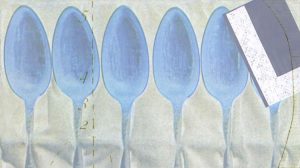
” … the milieu of chess players is far more sympathetic than that of artists.”
A man at The Remainders Table was pointing at my sketchbook.
” … huh?…”
“… I have come to the personal conclusion that while all artists are not chess players, all chess players are artists.”
I looked up; this man looked exactly like Marcel Duchamp.
“… what d-d-do you mean?”
“The chess pieces are the block alphabet which shapes thoughts; and these thoughts, although making a visual design on the chessboard, express their beauty abstractly, like a poem … ”
“I’m confused,” I said, staring into his gray face.
“In my life chess and art stand at opposite poles, but do not be deceived. Chess is not merely a mechanical function. It is plastic, so to speak. Each time I make a movement of the pawns on the board, I create a new form, a new pattern, and in this way I am satisfied by the always changing contour.”
“What are you talking about?”
” … as soon as we start putting our thoughts into words and sentences everything gets distorted, language is just no damn good-I use it because I have to, but I don’t put any trust in it. We never understand each other.”
He held up the chessboard he was holding; each black and white square carried a symbol or word. He motioned me to choose a square.
I pointed to the words “Thing of beauty.”
“Chess … has all the beauty of art – and much more.”
He put the chessboard down, pulled a handkerchief out of his pocket, wiped his face, took a deep breath, “… the hardest was when I told myself ‘Marcel no more painting, go get a job.’ I looked for a job in order to get enough time to paint “for myself.”
He called himself Marcel.
“W-hat d-id you do?”
“I got a job as a librarian in Paris in the Bibliotheque St Genevieve,” he said. “It was a wonderful job because I had so many hours to myself. There are two kinds of artist: the artist that deals with society, is integrated into society; and the other artist, the completely freelance artist, who has no obligations…I didn’t want to depend upon my painting for a living.”
This man who looked so much like Marcel Duchamp, who called himself “Marcel,” was leaning against The Remainder’s Table of the last bookstore standing in my city. Had I not been afraid he would vanish, I would have taken a photo with my phone.
“People get the wrong idea about my not painting,” said Marcel. “It’s true and it’s not true at the same time. But I did not take a vow. That’s all nonsense…Yes a myth. I’m ready to paint if I have an idea. But it’s the idea that counts.”
I did not have a thing to say.
“If you wish,” said Marcel, “my art would be that of living: each second, each breath is a work which is inscribed nowhere, which is neither visual nor cerebral.”
He pulled a cigar out of his pocket; it was lit.
If he could conceal light from the lit, if he could smoke, he had to be real …
Marcel puffed on his cigar, blowing smoke in my face.
I pointed to the word “recluse.”
“It’s very important for me not to be engaged with any group. I want to be free, I want to be free from myself, almost.”
I felt an urge to touch his arm.
“And,” he added, “I have never felt a pressing need to express myself… morning, noon and night.”
I looked down at my sketchbook.
“Instead of spending my life creating works of art in the form of paintings or sculptures,” he said. “I now believe that you can quite readily treat your life, the way you breathe, act, interact with other people, as a picture, a tableau vivant or a film scene, so to speak. These are my conclusions now: I never set out to do this when I was 20 or 15, but I realize, after many years, that this was fundamentally what I was aiming to do.”
He blew smoke rings in the air.
We were enveloped in shimmering light, spliced by the screams of a cashier. “You can’t do that! Stop! Smoking’s not allowed here!!!!
“B-b-b-ut h-h-h-h-he’s M-M-M-M-ar-c-c-c-el Du-du-du-,” I was choking on my words; I tried to grab hold of The Remainders Table.
When I finally caught my breath, Marcel was gone.
“Marcel Duchamp! Marcel Duchamp! Please come back!”
“Since a three-dimensional object casts a two-dimensional shadow, we should be able to imagine the unknown four-dimensional object whose shadow we are.”
I heard his voice but could not see his face.




Leave a Reply